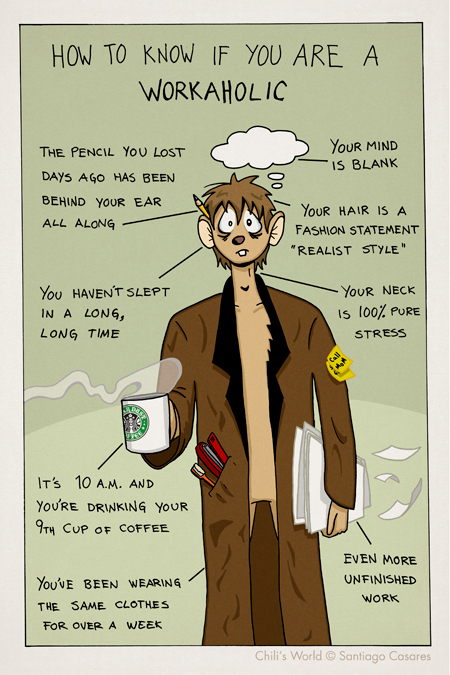Being Workaholic Is Really Bad for You

If being workaholic has a negative connotation these days, it does so only barely. People often use the term in a humblebrag sort of way, ”I’m a total workaholic” being shorthand for possessing the striving sort of personality of a successful person. But a recent metanalysis recent about this trait published in the Journal of Management shows that it can be pretty damaging, personally, and that it also doesn’t lead to better work performance.
Clark said that while promoting a workaholic culture in the U.S. and elsewhere is often seen as promoting hard work and a viable route to moving up in a company, negative consequences are also apparent.
"Our results show that while unrelated to job performance, being workaholic does influence other aspects like job stress, greater work-life conflict, decreased physical health and job burnout that indicate workers aren’t going to be productive," she said.
The researchers found no connections to external explanations for being workaholic relating to financial reward or self-efficacy. Instead, the condition was highly related to perfectionism and the achievements of so-called Type A personalities.
Clark also said that it’s also important to separate being workaholic from work “engagement”, "When you look more broadly at the outcomes that were overwhelmingly negative and compare those to other analyses of work engagement, which were overwhelmingly positive, we see that there are two very different constructs," Clark said. "One is feeling driven to work because of an internal compulsion, where there’s guilt if you’re not working—that’s being workaholic. The other feeling, is wanting to work because you feel joy in work and that’s why you go to work everyday, because you enjoy it. And I say that is work engagement."
So for those of you reading this bleary-eyed from a cubicle, wondering whether you’re working too much, a Monday morning might be as good a time as any to ask whether you’re actually addicted to your work in a potentially harmful way as opposed to happily, healthily engaged with it.
Article Source: https://www.yahoo.com/health/workaholism-is-really-bad-for-you-101759990467.html
Image Source: http://santiagocasares.com/chilisworld/wp-content/uploads/2011/09/2011-06-14-Chili019.jpg
VOCABULARY WORDS:
1. Workaholic (n.) ~ a person who works compulsively at the expense of other pursuits
2. Connotation (n.) ~ the associated or secondary meaning of a word
3. Humblebrag (n.) ~ a self-depreciating statement whose actual purpose is to draw attention
4. Viable (adj.) ~ having the ability to grow, expand, or develop
5. Consequence (n.) ~ the effect, result, or outcome of something that happened earlier
6. Apparent (adj.) ~ readily seen
7. Compulsion (n.) ~ an inner drive that causes a person to perform certain actions
8. Bleary-eyed (adj.) ~ with eyes blurred
9. Cubicle (n.) ~ a small space or compartment partitioned off
10. Oppose (v.) ~ to act against
COMPREHENSION QUESTIONS:
1. What are the negative effects of being a workaholic according to the article?
2. What is the main difference of being a workaholic and being engaged at work?
3. Based on the article, are you a workaholic or are you engaged at work?
QUESTIONS FOR DISCUSSION:
1. Is being a workaholic also fostered in your country? How?
2. How can being a workaholic affect the person’s family life adversely?
3. What do you think is the ideal working time and workload for the employees in your company?